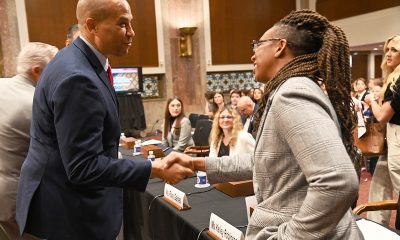Politics
Gen Z and the Gerontocracy
Many young voters across the Democratic ideological spectrum said substantive representation was more important to them
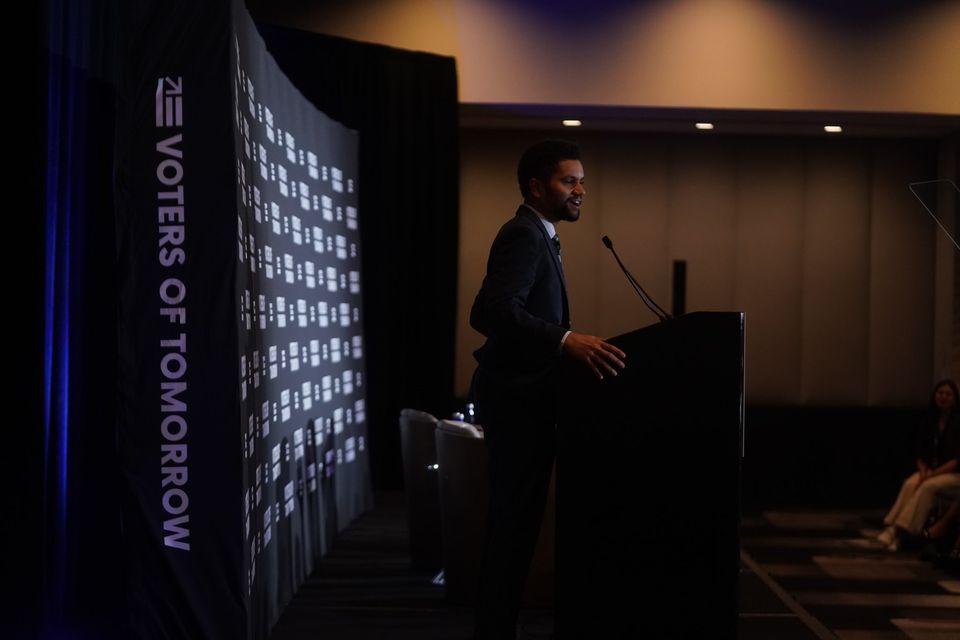
America’s leadership is older than ever but its electorate is younger than ever. Will Gen Z turn out in 2024 for the elderly Democratic president?
By Gabe Fleisher | WASHINGTON – America’s political gerontocracy was on full display last week, as Senate Minority Leader Mitch McConnell, 81, appeared to experience a medical episode during a press conference and California Sen. Dianne Feinstein, 90, had to be repeatedly told how to vote on a key bill.
On the other side of Pennsylvania Avenue, White House aides have been making changes to President Biden’s schedule and routine to adapt for his age. At 80, he is the oldest president in American history and one of the oldest heads of government in the world; meanwhile, the current U.S. Congress is the third-oldest in history.
But, at the same time as older politicians are making up a growing proportion of the government, younger voters are making up a growing proportion of the electorate. According to Democratic pollster Celinda Lake, in the four election cycles in which Generation Z has been eligible to vote, youth voter turnout has been up 25% compared to the previous nine cycles.
Largely due to that soaring turnout, in the 2018, 2020, and 2022 elections, the Gen Z vote was critical to the results, giving young voters a power over politics they have rarely wielded throughout history.
This fundamental mismatch — leaders grayer than ever and voters greener than ever — is at the heart of American politics right now. It will also be central to the next election: if Biden’s advanced age leads even a small percentage of young voters who supported him in 2020 to stay home or vote against him in 2024, it could be decisive.
As Harvard’s John Della Volpe recently noted, in this century, whenever Democratic presidential candidates have received at least 60% of the youth vote (Obama in 2008 and 2012; Biden in 2020), they have won the election. Whenever they have received less than 60% (Gore in 2000; Kerry in 2004; Clinton in 2016), they have lost.
Over the weekend, about 275 members of this sought-after voting bloc gathered at the famed Watergate Hotel in Washington, D.C., for a summit hosted by Voters of Tomorrow, a prominent left-leaning Gen Z group.
The speakers were a mix of young and old, and their tones varied dramatically by generation. Democratic Party eminence Nancy Pelosi, 83, a self-described “voter of yesterday,” was the first to address the group. “We cannot be fearmongers. We don’t want to go out there and say, ‘Blah blah blah blah,’” she said during her remarks, mimicking a nagging voice.
Pelosi was followed by New York Rep. Jamaal Bowman, 47, who was greeted with a hero’s welcome. “Wassup wassup!” he said as he took the stage. While Pelosi’s speech closed with a paean to the national anthem, Bowman took a different tack. “As you know, the Constitution, the Declaration of Independence, the Founding Fathers, they did great things, but they were fundamentally flawed,” he said. (Later, at a different session of the conference, when a speaker asked how many of the attendees described themselves as “patriotic,” only a scattering of hands went up.)
Ignoring Pelosi’s warning against fearmongering, Bowman focused his speech not on legislation, but on the ills facing the country right now. “A new American Revolution” is underway, he declared, led by Gen Z. Florida Rep. Maxwell Frost, 26, similarly invoked Gen Z as a bulwark against the “far-right-wing fascist movement growing in this country.”
Notably, unlike old-guard institutionalists like Pelosi, many of the younger speakers offered almost as many criticisms of the Democratic Party as they did Republicans. “People have been beaten down by our system,” Bowman said. “By design, by the way. And not just Republicans. Democrats have been guilty of this too.” The statement was met by loud cheers and applause from the largely Democratic audience.
“I used to joke with people, if I didn’t run for something else, I was going to leave the Democratic Party,” North Carolina Democratic Party chair Anderson Clayton, 25, said, adding that her goal is to “make people feel like this party gives a damn about them again.”
That skeptical attitude is shared among many young voters. Several of the conference attendees told me they felt much less attached to a political party than their parents. Polling bears this out as well: John Della Volpe, the Harvard pollster, recently wrote that his surveys show declining numbers of young Americans are identifying as Democrats, paying close attention to the news, or describing politics as a “meaningful way to create change in the system.”
Those metrics, he said, were some of the ones that indicated strong Democratic performance ahead of the 2018, 2020, and 2022 elections; now, he views them as “flashing red” warning signs for Democrats ahead of 2024.
“I think that Trump’s election in ’16 and the aftermath in ’17 showed the concrete ways in which politics can impact people’s lives,” Della Volpe told me in an interview. “And I think that for young people who aren’t paying as close attention to the news as others, I think they’re struggling to find similar concrete examples of government making a meaningful difference in their lives, and that’s driving the cynicism.”
“[Young] people are really apathetic right now to voting,” Clayton, the youngest state party chair in the country, told me. “They don’t believe their vote actually matters. And I think that part of what we have a job to do as a party is to ensure people know that we care about them again, because I feel like part of why people don’t vote right now is they’re like, ‘I don’t see myself represented in the Democratic Party.’”
Among young voters, views on the effectiveness of working through the political system to create change almost perfectly mirror views on the Biden presidency. In Della Volpe’s latest Harvard polling, 58% of 18-to-29-year-olds agreed with the statement “politics today are no longer able to meet the challenges our country is facing,” a 27-point increase since 2018. 61% of young voters in the same poll said they disapproved of Biden’s job performance.
It shouldn’t be surprising that the two metrics are moving in tandem. Biden, after all, is a 50-year veteran of elected office; he is as much an avatar for the political system, and the belief that change can be made through compromise, as anyone alive today. Supporting Biden also represents a compromise in itself for young Democrats, who overwhelmingly voted against him in the 2020 primaries.
As with any youth movement, pragmatists and idealists could be found in equal measure at the Voters of Tomorrow summit. One attendee joked to me that the more dressed-up someone at the summit was, the more you could tell they were planning to run for office one day (or that they were already officeholders). Mirroring the Democratic divide in which the party’s leaders are gung-ho for Biden 2024 while its voters are hesitant about him seeking re-election, I found these aspiring pols in suit jackets much more amenable to the president than their aspiring activist counterparts.
“They’re doing outreach, their messaging is doing very well… It’s not on all issues. We don’t agree with them on everything, obviously,” Quentin Colón Roosevelt, a 19-year-old local commissioner in D.C. and Theodore Roosevelt’s great-great-great grandson, told me of the Biden campaign. “But I think they’ve done a really good job so far, making sure we feel included in their campaign.”
“To paraphrase Milton Friedman, we’re all Bidenists now,” another office-seeking young attendee told me.
But over in the non-Milton-Friedman-quoting sector of the summit, Biden wasn’t quite so popular. “Definitely, in Gen Z, there is a lack of confidence in Biden’s capabilities to solve certain issues, particularly things like climate change,” Odessa Hotte, a 21-year-old student at Virginia Commonwealth University, told me. “There’s so many people saying, ‘Oh, he’s doing great, he’s doing great,’ and we’re sort of looking at it as, well, actually, there’s been some good things, but there’s also a lot that’s left to be desired.”
“I personally am not a huge fan of Biden, and I wasn’t when he was elected, either,” Hotte added, although she said she will “probably” support him in the 2024 election.
Asked if she believed young voters were enthusiastic about Biden, Anderson Clayton, the 25-year-old state party chair, said: “You know what’s so funny, someone earlier asked me that. They said, ‘I’ve asked every person at this conference and they’ve said no.’”
But Clayton, who is tasked with delivering the Democrats’ long-held hopes of flipping North Carolina, insisted that she is excited. “I think that Joe Biden is doing everything that he can right now and anything that a Democrat could do right now, honestly, to advance and move our country forward,” she told me.
Santiago Mayer, the 21-year-old founder of Voters of Tomorrow, acknowledged in an interview that differing “theories of change” and opinions on Biden existed among attendees at the summit. “I think that’s what’s so beautiful about this space,” he said, “that we can have all those differing philosophies, all those differing views, and still come together because we share the same goals.”
But at times, the differences commingled uncomfortably. With 12 million social media views and counting, perhaps the most viral moment from the summit — and the moment that best represented the generational divide in the Democratic Party right now — took place during White House press secretary Karine Jean-Pierre’s remarks.
Jean-Pierre, 48, was extolling Biden’s climate record when an attendee, 21-year-old Elise Joshi, stood up to interrupt her. “Excuse me for interrupting, but asking nicely hasn’t worked out,” Joshi said, before calling on the Biden administration to stop approving new oil and gas pipelines, an issue that has led to some of the biggest clashes between Biden and young voters.
“Let her talk, let her talk,” Jean-Pierre said when a conference organizer quickly approached Joshi. Eventually, when other attendees began to speak (“Declare a climate emergency!”) and snaps and applause broke out for the hecklers, Jean-Pierre ended the exchange.
“This is not a call and response. This is me actually delivering a speech to all of you,” Jean-Pierre said, adding: “This is a president who has had a climate change agenda like no other.”
“Promises kept, that’s all I’m asking,” Joshi said before sitting down.
Mayer told me that Voters of Tomorrow shares some of Joshi’s concerns, but that “we are very proud of President Biden’s climate record.” Jean-Pierre handled the back-and-forth “perfectly,” he added, expressing gratitude for the “administration’s partnership.” (Joshi is the executive director of her own youth voter group, Gen Z for Change. The group, notably, was founded with the name TikTok for Biden and has also worked with the White House in the past.)
In a sign of some of the same divergences in tone I noticed during their speeches, several young elected officials later tweeted in support of Joshi after the exchange. “We are running out of time,” Frost, the first Gen Z congressman, wrote. “We can’t afford to approve projects that will increase emissions. Every move should bring us to net zero. Our humanity depends on it. @EliseJoshi is a patriot.”
If there is any issue in which negative opinions about Biden and existential apathy about the political system intersect among young people, it’s climate change.
“I think it can feel overwhelming to feel like the burden is on our shoulders to solve all of these problems [connected to climate change],” Hotte said. “I think that’s maybe where some of that pessimism is stemming from, just from feeling like there’s so much to do and so little time.”
At one point in the summit, Generational Lab founder Cyrus Beschloss, 26, conducted an informal straw poll of which issue mattered most to the audience. More than half of the hands went up for climate change. No other issue garnered anywhere close to as much support.
According to the Harvard Youth Poll, in 2013, 29% of 18-to-29-year-olds agreed with the statement “Government should do more to curb climate change, even at the expense of economic growth.” 50% of 18-to-29s believe that today.
In political science, scholars refer to two types of political representation: “descriptive” and “substantive.” Descriptive representation is when an officeholder shares the identity of a certain group; substantive representation is when an officeholder shares the group’s views on policy.
I opened the newsletter by referring to an absence of descriptive representation, which young voters obviously lack from Biden and other elderly politicians. But without using the exact term, many young voters across the Democratic ideological spectrum told me substantive representation was more important to them anyway. The age of a candidate matters, but their policies matter a lot more.
It is these voters Biden will have to persuade in 2024 that he has done enough to satisfy their demands on climate and other issues — and that electoral politics are worth engaging with in the first place. “I think it’s been a challenge for an analog president to communicate with a digital generation,” Della Volpe, who advised the Biden 2020 campaign, said.
The challenge is made harder by Gen Z’s nuanced political identity: more likely than adults to hold left-leaning political views, but less likely than adults to identify with the left-leaning political party. Unlike their more politically tribal parents, many young voters view themselves as proudly unmoored from any candidate or party. At one point, Clayton, a Democratic Party official, described the Democratic Party merely as “the party we find ourselves in,” suggesting more of a temporary alliance than permanent membership.
“I really care that the Republicans don’t win the White House,” Grace Wankelman, a 23-year-old recent graduate of the University of Denver, told me, “but I also don’t want to just blindly support the other party… We’re gonna vote on issues that matter to us and make sure that the politicians that say they support these issues, that they follow through and actually show up and do what needs to be done.”
****************************************************************************************
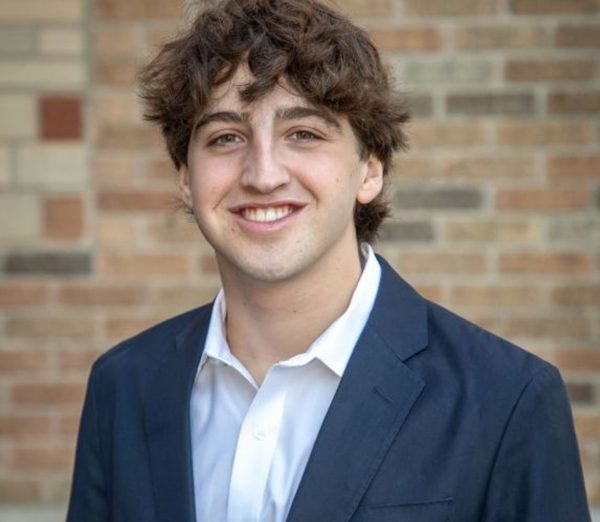
Gabe Fleisher is an award-winning journalist and editor-in-chief of Wake Up to Politics, a non-partisan political newsletter that he founded in 2011.
The preceding post was previously published by Wake Up to Politics, and is republished with permission.
If you’re interested in subscribing to the newsletter subscribe here. If you want to contribute to support Gabe’s work, please donate here.
Congress
White House finds Calif. violated Title IX by allowing trans athletes in school sports
Education Department threatens ‘imminent enforcement action’

The Trump-Vance administration announced on Wednesday that California’s Interscholastic Federation and Department of Education violated federal Title IX rules for allowing transgender girls to compete in school sports.
In a press release, the U.S. Department of Education’s Office of Civil Rights threatened “imminent enforcement action” including “referral to the U.S. Department of Justice” and the withholding of federal education funding for the state if the parties do not “agree to change these unlawful practices within 10 days.”
The agency specified that to come into compliance; California must enforce a ban excluding transgender student athletes and reclaim any titles, records, and awards they had won.
Federal investigations of the California Interscholastic Federation and the state’s Department of Education were begun in February and April, respectively. The Justice Department sued Maine in April for allowing trans athletes to compete and refusing a similar proposal to certify compliance within 10 days.
Broadly, the Trump-Vance administration’s position is that girls who are made to compete against trans opponents or alongside trans teammates are unfairly disadvantaged, robbed of opportunities like athletics scholarships, and faced with increased risk of injury — constituting actionable claims of unlawful sex discrimination under Title IX.
This marks a major departure from how the previous administration enforced the law. For example, the Department of Education issued new Title IX guidelines in April 2024 that instructed schools and educational institutions covered by the statute to not enforce categorical bans against trans athletes, instead allowing for limited restrictions on eligibility if necessary to ensure fairness or safety at the high school or college level.
Sports aside, under former President Joe Biden the department’s Office of Civil Rights sought to protect against anti-LGBTQ+ discrimination in education, bringing investigations and enforcement actions in cases where school officials might, for example, require trans students to use restrooms and facilities consistent with their birth sex or fail to respond to peer harassment over their gender identity.
Much of the legal reasoning behind the Biden-Harris administration’s positions extended from the 2020 U.S. Supreme Court case Bostock v. Clayton County, which found that sex-based discrimination includes that which is based on sexual orientation or gender identity under Title VII rules covering employment practices.
A number of high profile Democrats, including California Gov. Gavin Newsom, have recently questioned or challenged the party’s position on transgender athletes, as noted in a statement by Education Secretary Linda McMahon included in Wednesday’s announcement.
“Although Gov. Gavin Newsom admitted months ago it was ‘deeply unfair’ to allow men to compete in women’s sports, both the California Department of Education and the California Interscholastic Federation continued as recently as a few weeks ago to allow men to steal female athletes’ well-deserved accolades and to subject them to the indignity of unfair and unsafe competitions.”
Congress
Garcia elected top Democrat on the House Oversight Committee
Gay Calif. lawmaker vows to hold Trump-Vance administration accountable

U.S. Rep. Robert Garcia (D-Calif.) on Tuesday was elected top Democrat on the House Oversight Committee in a vote that signaled the conference’s overwhelming support for a newer voice on Capitol Hill who will play a key role taking on President Donald Trump.
With a margin of 150-63, the 47-year-old openly gay congressman defeated U.S. Rep. Stephen Lynch (D-Mass.), alongside U.S. Reps. Jasmine Crockett (D-Texas) and Kweisi Mfume (D-Md.) who exited the race after the House Democratic Steering and Policy Committee backed Garcia.
Serving only since 2023, the congressman has had a remarkably quick ascent leading up to his election this week as ranking member of one of the most powerful House committees, awarded a leadership position serving under House Democratic Whip Katherine Clark (Mass.) and selected as a co-chair of former Vice President Kamala Harris’s 2024 presidential campaign.
Democratic members began jockeying for the top seat on the oversight committee this spring after the late-U.S. Rep. Gerry Connolly of Virginia stepped away amid news that his esophageal cancer had returned. He died in May.
Connolly last year fended off a challenge from one of the most well known House Democrats, U.S. Rep. Alexandria Ocasio-Cortez (N.Y.), though with a narrower margin that signaled intra-party tensions over whether leadership roles should still be awarded based on seniority.
Garcia positioned himself as a bridge between the two camps — a consensus candidate with executive managerial experience as the former mayor of Long Beach. At the same time, particularly since the start of Trump’s second term, the congressman has emerged as one of the most outspoken critics of the new Republican regime.
In a statement on X Tuesday, Garcia thanked his colleagues and promised to “hold Donald Trump and his administration accountable.”
I'm honored to have been elected by @HouseDemocrats to serve as Ranking Member on @OversightDems.
— Congressman Robert Garcia (@RepRobertGarcia) June 24, 2025
We will hold Donald Trump and his Administration accountable for their corruption – and work to make our government more effective for the American people.
Let's get to work.
If Democrats win control of the House next year, the oversight committee will be able to exercise powers that are now available only to Republicans under the chair, U.S. Rep. James Comer (R-Ky.), which include the authority to investigate virtually any matter across the federal government, to issue subpoenas, and to compel testimony.
In the meantime, Garcia on Monday promised that Democrats on the committee would “vigorously fight” Republican Speaker Mike Johnson’s (La.) plans “to dismantle the Government Accountability Office.”
Congress
Padilla forcibly removed from federal building for questioning DHS secretary
Prominent Democrats rushed to defend senator

Democratic U.S. Sen. Alex Padilla of California was forcibly removed from a federal building in Los Angeles after attempting to ask questions of U.S. Homeland Security Secretary Kristi Noem during a press conference on immigration Thursday
The city has been rattled in recent days as protestors objecting to the Trump-Vance administration’s immigration crackdowns clashed with law enforcement and then the president deployed National Guard troops and U.S. Marines, which was seen as a dramatic escalation.
According to a video shared by his office, the senator, who serves as ranking member of the Senate Judiciary Immigration Subcommittee, introduced himself and said, I have questions for the secretary.” After he was pushed out of the room, officers with FBI-identifying vests told Padilla to put his hands behind his back and handcuffed him.
“Senator Padilla is currently in Los Angeles exercising his duty to perform Congressional oversight of the federal government’s operations in Los Angeles and across California,” reads a statement from his office.
“He was in the federal building to receive a briefing with General Guillot and was listening to Secretary Noem’s press conference,” the statement continued. “He tried to ask the secretary a question, and was forcibly removed by federal agents, forced to the ground and handcuffed. He is not currently detained, and we are working to get additional information.”
Democrats were furious, with many releasing strong statements online condemning the actions of law enforcement officers, including California Gov. Gavin Newsom (D), Los Angeles Mayor Karen Bass (D), and the state’s other U.S. senator, Adam Schiff (D).
Human Rights Campaign Chief of Staff Jay Brown also issued a statement: “A sitting U.S. senator should be allowed to ask a Cabinet secretary a question at a press conference — in his own state, on an issue affecting his constituents — without being violently thrown to the floor and handcuffed. Everyone who cares about our country must condemn this undemocratic act. Full stop.”
Congress
51 lawmakers sign letter to Rubio about Andry Hernández Romero
U.S. Rep. Robert Garcia (D-Calif.) spoke about gay Venezuelan asylum seeker

Forty nine members of Congress and two U.S. senators, all Democrats, signed a letter Monday to Secretary of State Marco Rubio demanding information about Andry Hernández Romero, a gay Venezuelan national who was deported to El Salvador and imprisoned in the country’s notorious Terrorism Confinement Center, a maximum-security prison known by the Spanish acronym CECOT
“We are deeply concerned about the health and wellbeing of Mr. Hernández Romero, who left Venezuela after experiencing discriminatory treatment because of his sexual orientation and opposition to Venezuela’s authoritarian government,” the lawmakers wrote. They urged the State Department to facilitate his access to legal counsel and take steps to return him.
After passing a credible fear interview and while awaiting a court hearing in March, agents with U.S. Immigration and Customs Enforcement reportedly transported Hernández out of the U.S. without due process or providing evidence that he had committed any crime.
In the months since, pressure has been mounting. This past WorldPride weekend in Washington was kicked off with a rally in front of the U.S. Supreme Court and a fundraiser, both supporting Hernández and attended by high profile figures including members of Congress, like U.S. Rep. Mark Takano (D-Calif.)
U.S. Rep. Robert Garcia (D-Calif.) was among the four members who wrote to Rubio about Hernández in April. On Friday, he spoke with the Los Angeles Blade before he and his colleagues, many more of them this time, sent the second letter to Rubio.
“There’s a lot of obviously horrible things that are happening with the asylum process and visas and international students and just the whole of our value system as it relates to immigration,” he said, which “obviously, is under attack.”
“Andry’s case, I think, is very unique and different,” the congressman continued. “There is, right now, public support that is building. I think he has captured people’s attention. And it’s growing — this is a movement that is not slowing down. He’s going to be a focal point for Pride this year. I mean, I think people around the world are interested in the story.”
Garcia said he hopes the momentum will translate to progress on requests for proof of life, adding that he was optimistic after meeting with Hernández’s legal team earlier on Friday.
“I mean, the president, Kristi Noem, Marco Rubio — any of these folks could could ask to see if just he’s alive,” the congressman said, referring to the secretary of Homeland Security, whom he grilled during a hearing last month. ICE is housed under the DHS.
“People need to remember, the most important part of this that people need to remember, this isn’t just an immigration issue,” Garcia noted. “This is a due process issue. This is an asylum case. We gave him this appointment. The United States government told him to come to his appointment, and then we sent him to another country, not his own, and locked him up with no due process. That’s the issue.”
Garcia said that so far neither he nor his colleagues nor Hernández’s legal team were able to get “any answers from the administration, which is why we’re continuing to advocate, which is why we’re continuing to reach out to Secretary Rubio.”
“A lot more Democrats are now engaged on this issue,” he said. U.S. Sens. Adam Schiff and Alex Padilla, both from California, joined Monday’s letter. “The more that we can get folks to understand how critical this is, the better. The momentum matters here. And I think Pride does provide an opportunity to share his story.”
Asked what the next steps might be, Garcia said “we’re letting his legal team really take the lead on strategy,” noting that Hernández’s attorneys have “already engaged with the ACLU” and adding, “It’s very possible that the Supreme Court could take this on.”
In the meantime, the congressman said “part of our job is to make sure that that people don’t forget Andry and that there is awareness about him, and I think there’s a responsibility, particularly during WorldPride, and during Pride, all throughout the month — like, this is a story that people should know. People should know his name and and people should be aware of what’s going on.”
Breaking News
Controversy brews in the City of Glendale over support of Pride event
Republican Mayor Ara Najarian pushes back on funding family-friendly Pride event

Over the last three weeks, glendaleOUT — a local LGBTQ group based in Glendale, California and city leadership have been at odds over securing financial support of a family-friendly Pride event set to happen on Saturday, June 7. As of Tuesday, Glendale’s city council voted 3-2 in favor of funding the event, ending a weeks-long argument over securing the funds.
The controversy began when the group highlighted how neighboring cities have visibly demonstrated support for Pride Month celebrations across the county, while the City of Glendale has yet to sponsor events with banners, city logos and financial sponsorship.
Councilmember Dan Brotman proposed $5,000 in sponsorship funds, noting that the city has funded other cultural events with much larger amounts.
Local leaders, but specifically Mayor Ara Najarian — who was just re-elected for a fifth term — are pushing back and opposing the proposal for funding. According to sources, Mayor Najarian openly opposed the proposal, stating a distant conflict of interest as the reason for the opposition.
LGBTQ advocates have been quoted as saying this is a “bad-faith political tactic, not grounded in any real conflict of interest.”
The next potential vote is expected to happen today at a city council meeting. Organizers say that the Pride event will happen regardless, but that they still hope to shed light on the patterns of sexual orientation-based discrimination in the city council.
For more information about the free community Pride event, visit glendaleOUT’s website.
California
LA County officially kicks off Pride Month with blessing from The Sisters of Perpetual Indulgence
‘This needs to be done, because once again, our county and our nation houses people who want us gone, who wish us harm’
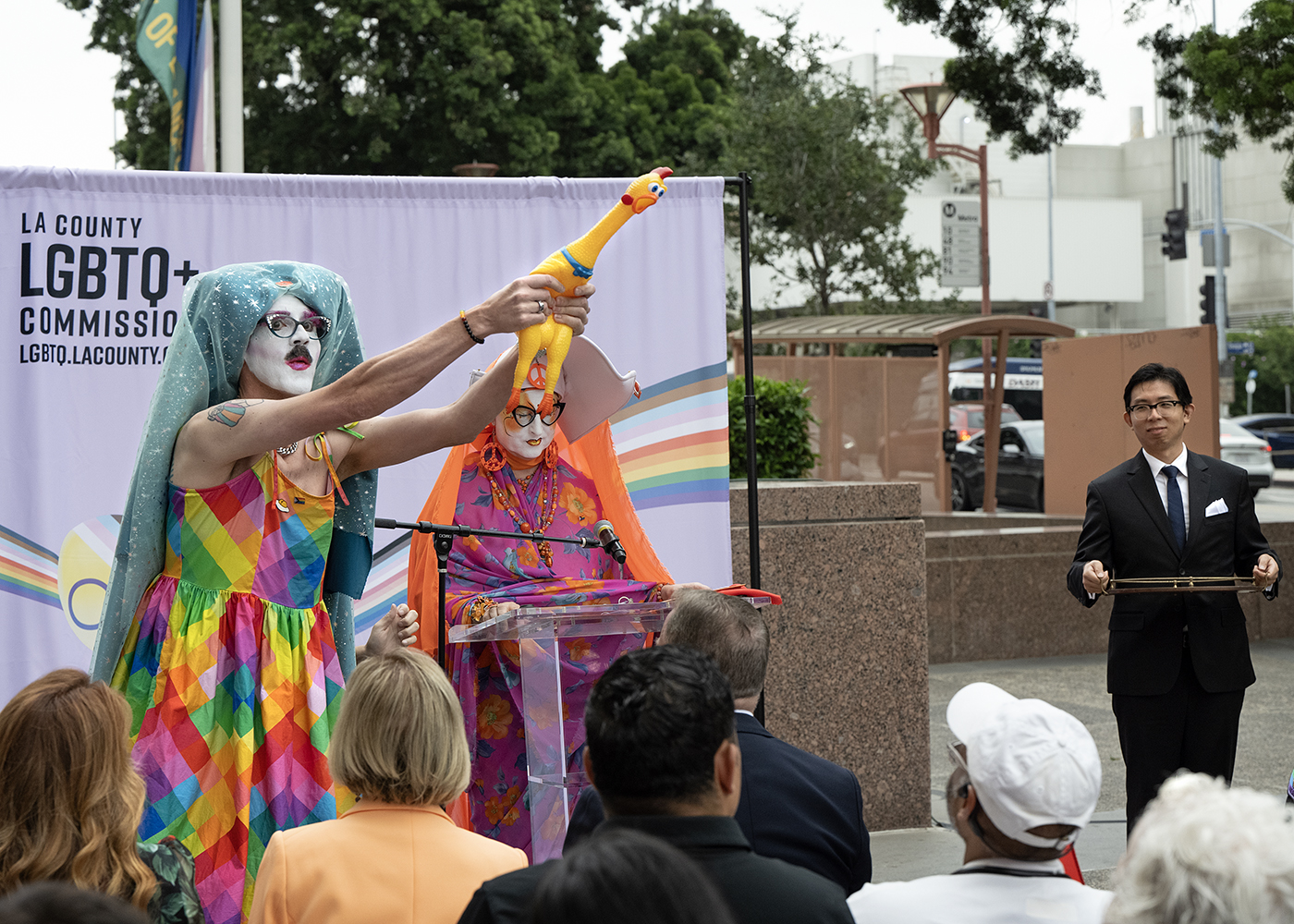
The LA County Board of Supervisors and the LA County LGBTQ+ Committee gathered on Tuesday, June 3, to officially kick off Pride Month across the county with a blessing from The Sisters of Perpetual Indulgence, who purified the space with their sacred chicken, then led everyone in blessing the Progress Pride flag before raising it at the Kenneth Hall of Administration.
“By raising this flag, the emblem of our souls and of our souls, of our love, of our survival, and of the gifts we offer to every Angeleno in this county — you all declare and you declare to everyone both here and abroad, that we are your people and you affirm that this is our home too,” said Sister Unity. “This needs to be done, because once again, our county and our nation houses people who want us gone, who wish us harm.”
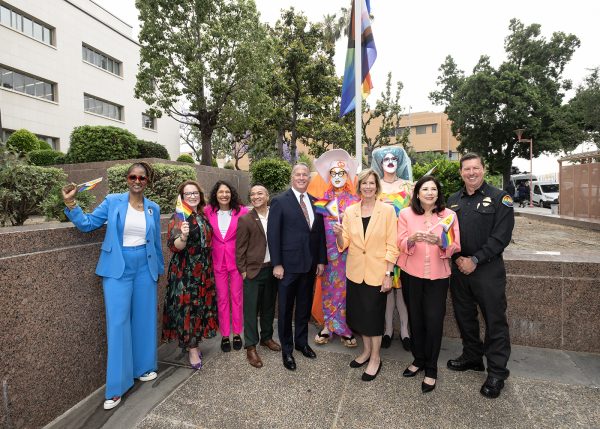
LA County Supervisors and other community leaders gathered on Tuesday at the Kenneth Hall of Administration to raise the Progress Pride flag in honor of Pride Month. (Photo credit to Diandra Jay)
Supervisors Janice Hanh, Holly J. Mitchell, Lindsey P. Hovarth and Hilda L. Solis spoke on the importance of representation in the face of discrimination, homophobia and transphobia.
Supervisor Hahn mentioned in her speech that her father, Kenneth Frederick Hahn designed the LA County flag and it was clear to her that he believed that a flag was more than just a piece of fabric.
“My dad, the original Supervisor Hanh, designed the LA County flag and he understood that a flag is not just fabric. A flag is a symbol. It’s a visual representation of who we are, what we value and what we stand for.”
Two years ago, Supervisor Hahn started the tradition to raise the flag alongside the one her father designed and then it was Supervisor Horvath who suggested that the Pride flag be flown on all county facilities across Los Angeles.
“Now, in every corner of our vast county — from our lifeguard stations on our beaches, to every library, fire station — and may I add: all eight county buildings in the city of Downey. Wherever there is a county facility, the Progress Pride flag will send a clear, powerful message to our LGBTQ residents: ‘your county government unequivocally and unapologetically has your back.’”
The comment about the city of Downey is in regards to a controversial Pride flag ban that was enacted last year.
Supervisor Hahn then introduced LA County Assessor Jeff Prang, one of the longest-serving, out, elected officials in the state of California. Due to his long history in government and as a member of the LGBTQ community, Assessor Prang helped launch the LA County LGBTQ Elected Officials Association with over 50 active members from all levels of government.
“We are in a moment of crisis in the nation. Across the country, an extremist movement is working to dismantle LGBTQ rights — from banning books to criminalizing gender-affirming care, to silencing drag performers, to targeting our youth and families with cruelty disguised as policy,” said Assessor Prang. “These are not isolated incidents, this is a campaign of fear and repression.”
Héctor Trinidad-Plascencia, the Chair of LGBTQ+ Commission, encouraged attendees who are not from the queer and trans communities, to remove the blockages that keep them from being in solidarity with queer and trans people.
“With your solidarity, we are creating a different world together starting in our county home and for the nation to follow,” they said.
White House
DOJ launches investigation into Calif. trans student-athlete policy
State AG vows to defend Golden State laws

One day after President Donald Trump threatened to strip California of “large scale federal funding” over its policy on transgender student-athletes, his Justice Department announced it is investigating the state for potentially violating Title IX.
“The investigation is to determine whether California, its senior legal, educational, and athletic organizations, and the school district are engaging in a pattern or practice of discrimination on the basis of sex,” the DOJ said in a statement.
The DOJ said it notified State Attorney General Rob Bonta, State Superintendent of Public Instruction Tony Thurmond, the Jurupa Unified School District, and the California Interscholastic Federation of its investigation.
AB Hernandez, 16, is an out trans female student-athlete at Jurupa Valley High School who qualified for this weekend’s state track and field championship. As the Los Angeles Blade reported earlier this week, the CIF announced a change in the rules at the finals to accommodate girls who were displaced by Hernandez, including giving medals to cisgender competitors who earn a podium spot should Hernandez place ahead of them.
“We remain committed to defending and upholding California laws and all additional laws which ensure the rights of students, including transgender students, to be free from discrimination and harassment,” said Bonta in a statement. “We will continue to closely monitor the Trump administration’s actions in this space.”
As KTLA reported, California is one of 22 states that allow trans student-athletes to participate in sports consistent with their gender identity. Former Gov. Jerry Brown signed that policy into law in 2013.
The DOJ announced it is also now supporting a federal lawsuit targeting Bonta and the state Department of Education, claiming that California law and CIF policy discriminate against cisgender girls by allowing trans female athletes to compete according to their gender identity.
The lawsuit was filed by a conservative law group, Advocates for Faith and Freedom, representing the families of two girls at Martin Luther King High School in Riverside. Their suit claims the school’s cross-country team dropped one athlete from her varsity spot in favor of a trans athlete and that school administrators compared their “Save Girls Sports” T-shirts to swastikas.
Officials in Washington also weighed-in, referring to trans girls and women as “males.”
“Title IX exists to protect women and girls in education,” said Assistant U.S. Attorney General for Civil Rights Harmeet K. Dhillon. “It is perverse to allow males to compete against girls, invade their private spaces, and take their trophies.”
“The law is clear: Discrimination on the basis of sex is illegal and immoral,” said U.S. Attorney Bill Essayli. “My office and the rest of the Department of Justice will work tirelessly to protect girls’ sports and stop anyone — public officials included — from violating women’s civil rights.”
According to Gov. Gavin Newsom’s office, out of the 5.8 million students in California’s K-12 public school system, the number of active trans student-athletes is estimated to be in the single digits.
Congress
Garcia confronts Noem over gay asylum seeker ‘forcibly removed’ to El Salvador
Andry Hernández Romero is makeup artist from Venezuela

California Congressman Robert Garcia on Wednesday asked Homeland Security Secretary Kristi Noem about the well-being of a gay asylum seeker from Venezuela who the U.S. “forcibly removed” to El Salvador.
The gay Democrat during a House Homeland Security Committee hearing asked Noem whether Andry Hernández Romero is “alive” and whether “we can check and do a wellness check on him.”
“This individual is in El Salvador, and the appeal would be best made to the president and to the government of El Salvador,” Noem told Garcia.
The Trump-Vance administration in March “forcibly removed” Hernández, who asked for asylum because of persecution he suffered due to his sexual orientation and political beliefs, and other Venezuelans from the U.S. and sent them to El Salvador.
The White House on Feb. 20 designated Tren de Aragua, a Venezuelan gang, as an “international terrorist organization.” President Donald Trump on March 15 invoked the Alien Enemies Act of 1798, which the Associated Press notes allows the U.S. to deport “noncitizens without any legal recourse.”
Alvaro M. Huerta, director of litigation and advocacy for the Immigrant Defenders Law Center, a Los Angeles-based organization that represents Hernández, said officials with U.S. Immigration and Customs Enforcement and U.S. Customs and Border Protection claimed their client is a Tren de Aragua member because of his tattoos.
The Washington Blade on April 17 reported Hernández was sent to El Salvador’s Terrorism Confinement Center, a maximum-security prison known by the Spanish acronym CECOT.
Garcia, along with U.S. Reps. Maxwell Alejandro Frost (D-Fla.), Maxine Dexter (D-Ore.), and Yassamin Ansari (D-Ariz.) last month met with U.S. Ambassador to El Salvador William Duncan and embassy staffers in San Salvador, the Salvadoran capital. The lawmakers did not visit CECOT, but Garcia told the Blade that the embassy agreed to ask the Salvadoran government to “see how (Hernández) is doing and to make sure he’s alive.”
California Politics
Zbur continues fight for LGBTQ rights amid Trump attacks
He continues to cement a pro-equality legacy in state legislature

Assemblymember Rick Chavez Zbur (D-51), 68, grew up in a rural farming community
surrounded by animals and land in Rio Grande Valley, New Mexico — ultimately becoming the first person in his rural community to attend an Ivy League university.
Since then, he has continued to build his reputation as an advocate and as a
political leader in environmental justice and LGBTQ rights.
Most recently, Zbur introduced Assembly Bill 309, which would support
California’s strategy to prevent the spread of HIV and viral hepatitis by preserving existing laws that increase access to sterile syringes at no added cost to the state.
“Extensive research and data collection has repeatedly proven that increased access to sterile syringes significantly lowers rates of transmission and saves lives
without increasing rates of drug use,” said Zbur when presenting AB 309.
He added that the average estimated cost for lifetime medical costs related to HIV treatment for one person is $326,500. “Syringe access not only saves lives, but it also saves individuals and the state from the steep cost of treatment,” he continued.
As a gay man in the peak of the AIDS crisis, Zbur saw some of his own close friends become ill, motivating him to become an AIDS activist at a time when the federal government was failing to provide resources to the community that needed them the most.
“Since I’ve been in the Assembly, I’ve always had a number of bills every year that focus on uplifting the LGBTQ community, as well as getting to zero, in terms of HIV — zero transmissions, zero deaths, zero stigma.”
Prior to this bill and a few others, Zbur also introduced AB 5, which he says was a culmination of eight years worth of work, from the time he started working for Equality California (EQCA), the state’s largest nonprofit organization dedicated toward advocating for LGBTQ civil rights.
AB 5, which was passed and is now known as the Safe and Supportive Schools
Act, is meant to improve the conditions for LGBTQ students in schools.
“I think this bill has the most impact for LGBTQ youth and it’s the one I’m proudest of because it requires that every teacher in California schools has LGBTQ cultural competency training, to make sure that our schools are safe and supportive.” Zbur, a longtime advocate for the LGBTQ community, has a long history of activism.
In the early 1980s, Zbur campaigned for the fight against HIV/AIDS, helped found the Children Affected by AIDS Foundation and alongside the Los Angeles LGBT Center, organized fundraisers for Bill Clinton while he was governor of Arkansas, and Barbara Boxer, who was then running for U.S. Senate.
“I think part of me coming out more publicly was due to the HIV epidemic and
the fact that I had friends that were getting sick,” he said. “I had a long-term boyfriend
back then and we started to get politically active, really trying to make sure that the
government was doing something about the HIV epidemic.”
He says that this is when he decided he was going to get Barbara Boxer elected, because she was the only Senate candidate during that time who was even mentioning the LGBTQ community.
In 1996, Zbur ran for the United States House of Representatives in California’s 38th congressional district against Republican incumbent Steve Horn. He became the first openly gay non-incumbent congressional primary candidate to win an election when he won the Democratic primary election on March 26, 1996.
During many years following that win, Zbur jumped into another pool of justice
fighting for environmental issues and then in 2014, joined Equality California as
executive director. Under his leadership, EQCA quadrupled in size, passed groundbreaking legislation to advance LGBTQ equality measures and sued the Trump-Pence administration twice, blocking attacks against the transgender community of California.
In 2022, Zbur was elected to the California State Assembly to represent the 51st
Assembly District, a position he currently serves. He was appointed in July 2023 by
Assembly Speaker Robert Rivas to serve as the Democratic Caucus Chair of the California Assembly, one of the Speaker’s key leadership positions. During that time, he also led the advancement in civil rights and social justice for the many other marginalized communities within the LGBTQ umbrella, such as communities of color, communities of faith, immigrants women and people living with HIV.
Zbur says that his work is never over.
“We’re facing greater risks that are greater than I think we’ve faced in recent
years coming out of the [first] Trump administration. The targeting of transgender and
gender non-conforming people is an even greater part of his hostility toward our
community,” he said. “It’s very real, and we see that it’s not just rhetoric. He’s taking real
steps to try to shut down the healthcare that LGBTQ people and transgender people
need.”
Zbur says that he and the other members of the LGBTQ Caucus in Sacramento
are constantly thinking of those decisions and their repercussions.
“I have another bill that is focused on helping transgender people get the
government documents they need, so they can protect themselves from the Trump
administration and so that they can travel easily to get medical care.”
Zbur says that his own coming out story was positive, but he grew up in a time
where he did not know anyone who was out about their identity. He went through many
trials and tribulations to end up in a space where he was finally accepted.
“For me, coming to terms with the fact that I was LGBTQ, was something that
took a number of years,” said Zbur. “The world was just a very different place back then
and the risks were high, coming out.”
When he started his career as a lawyer, he became a partner in a law firm called
Latham and Walkins, where there was not a single person who was out.
“I eventually came out when I was a fourth or fifth year associate and I became
the first out lawyer in the firm’s history, though there were other gay lawyers at the firm.”
Now, at 68, Zbur says that his only regret is that he lived in the closet for too long.
“When I look back at the things I regret, it’s that I lived in the closet for as long as
I did,” he said. “That is a very limiting thing that I think doesn’t allow your soul or your
spirit to flourish.”
California Politics
Governor Newsom supports bill to put LGBTQ helpline number on student ID’s
AB 727 would put the number for The Trevor Project on the back of students ID cards

Gov. Gavin Newsom expressed support for LGBTQ suicide hotline measures for K-12 students in direct response to recent reports that Secretary of Health and Human Services Robert F. Kennedy Jr’s., plans to cut funding for the national nonprofit that provides the resource to LGBTQ people.
“Cutting off kids’ access to help is indefensible. While the Trump administration walks away from its responsibility, California will continue to expand access to life-saving resources, because the life of every child — straight, gay, trans — is worth fighting for,” said Gov. Newsom.
Assembly Bill 727, introduced by Assemblymember Mark González, would aim to facilitate pupil and student safety by requiring schools and institutions to have the telephone number and text line for a specified LGBTQ suicide hotline provided by The Trevor Project, that is available 24 hours per day, 7 days per week.
Existing law that will be enforced July 1, 2025, requires a public or private school that serves pupils in any of grades 7 to 12, inclusive, and that issues pupil identification cards to have printed on the identification cards the number for the 988 Suicide and Crisis Lifeline.
This bill would additionally require the list of K-12 public schools and institutions to provide support to youth and their families who have been subjected to school-based discrimination, harassment, intimidation or bullying on the basis of gender identity, sexual orientation or gender expression.
Conservative organizations like the California Family Council are pushing back on this bill, stating that this bill is “forcing LGBTQ advocacy on every student ID — no exemptions for religious schools,” and saying it “undermines families.”
A national 2024 survey by The Trevor Project on mental health of LGBTQ young people, reports that 1 in 10 young LGBTQ-indetifying people in the United States attempted suicide in 2023. Over a third of LGBTQ young people seriously considered suicide within the past year and that figure was even higher for trans and nonbinary-identifying youth, with that figure being 46%.
The survey also found that half of LGBTQ youth who wanted mental health resources and care could not get them. Over 50% of survey respondents answered “a lot” when asked about how often recent politics negatively impact their well-being.
The Trevor Project is one of the nonprofit organizations that is currently at high-risk for losing their funding under Trump’s budget cuts.
The phone number to call for help is 1-866-488-7386 and the number to text for help is 678-678, or you can send them a message at the site link.
-

 Breaking News1 day ago
Breaking News1 day agoMajor victory for LGBTQ funding in LA County
-

 Congress5 days ago
Congress5 days agoWhite House finds Calif. violated Title IX by allowing trans athletes in school sports
-

 Features20 hours ago
Features20 hours agoKoaty & Sumner: Finding love in the adult industry
-

 a&e features4 days ago
a&e features4 days agoLatina Turner comes to Bring It To Brunch
-

 Books3 days ago
Books3 days agoTwo new books on dining out LGBTQ-style
-

 Television4 days ago
Television4 days ago‘White Lotus,’ ‘Severance,’ ‘Andor’ lead Dorian TV Awards noms
-

 El Salvador1 day ago
El Salvador1 day agoLa marcha LGBTQ+ desafía el silencio en El Salvador
-

 Miscellaneous5 hours ago
Miscellaneous5 hours agoCan you really find true love in LA? Insights from a queer matchmaker
-

 Arts & Entertainment6 hours ago
Arts & Entertainment6 hours agoIntuitive Shana gives us her hot take for July’s tarot reading






